|

by Makia Freeman
August 26, 2015
from
ToolsForFreedom Website
|
Makia Freeman is
the editor of The Freedom Articles and senior researcher
at ToolsForFreedom.com, writing on many aspects of truth
and freedom, from exposing aspects of the global
conspiracy to suggesting solutions for how humanity can
create a new system of peace and abundance. |
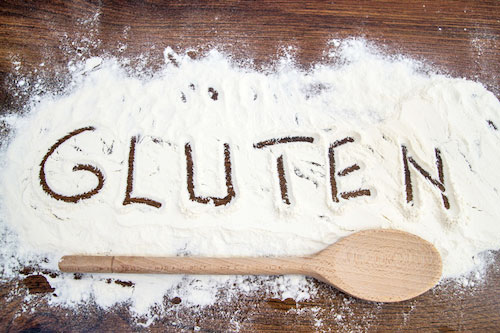
Is gluten the
enemy?
For the vast majority
of people, it most likely poses no real problem.
Gluten-free food is now very common and available, whether you are
in a restaurant, cafe or grocery store.
Although there are definitely people who
suffer from celiac disease and other diseases triggered by gluten,
the entire gluten-free movement has left many health experts and
nutritionalists scratching their heads in bewilderment.
-
Since when did large chunks of
populations used to eating bread, pasta and other wheat
products suddenly suffer from gluten sensitivity, especially
when their genetic ancestors have a long history of
consuming wheat (even if the gluten levels were lower back
then)?
-
Is it more accurate to call the
movement the gluten-free fad or the gluten-free craze?
Several studies are suggesting people
who think they are gluten sensitive are not, and that
wheat is not to blame for the rise
of celiac disease.
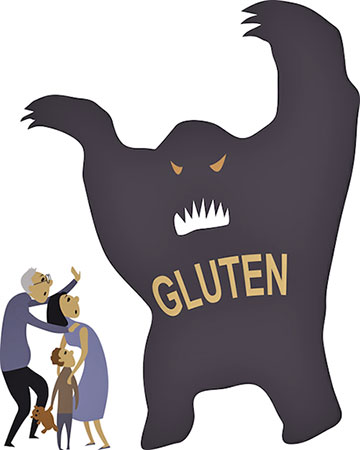
Several studies have
concluded
that most gluten
sensitivity is imagined.
Most Gluten Sensitivity is
Imagined
For those who don't know, gluten is a
protein found in wheat, rye, barley, and other grains. It is what
gives bread its chewiness. Gluten is also used as a meat substitute
(such as in seitan, Tofurky or some veggie sausages).
Gluten-free is now a big industry.
As this article on
ScienceAlert.com states:
"30%
of people want to eat less gluten. Sales of gluten-free
products are estimated to hit $US15 billion by 2016. Although
experts estimate that only 1% of Americans - about 3 million
people - actually suffer from celiac disease,
18% of adults now buy gluten-free foods."
The whole hype surrounding gluten has
arisen from the fact the wheat in the USA has been greatly
hybridized to increase gluten content.
According to some reports, Americans in
around the 1950s used to be eating wheat with about a 3% gluten
content, and are now eating wheat with about a 50% gluten content.
That massive jump has (justifiably)
caused concern for many. However, what has mostly come out this has
been a large-scale demonization of gluten and demonization of wheat.
ScienceAlert.com reports:
"The subjects cycled through
high-gluten, low-gluten, and no-gluten (placebo) diets,
without knowing which diet plan they were on at any given
time.
In the end, all of the treatment
diets - even the placebo diet - caused pain, bloating,
nausea, and gas to a similar degree. It didn't matter if the
diet contained gluten.
"In contrast to our first study…
we could find absolutely no specific response to gluten,"
Gibson wrote in the paper.
A third,
larger study published this month has
confirmed the findings.
It seems to be a 'nocebo' effect -
the self-diagnosed gluten sensitive patients expected to feel
worse on the study diets, so they did."
Thus, the study found that most people
who thought they had gluten sensitivity did not, and so leads us to
believe that many people pursuing gluten-free diets may be doing so
unnecessarily.
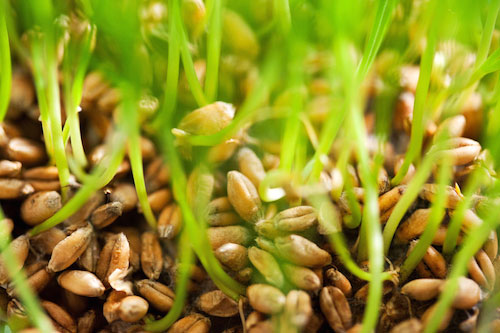
The gluten-free fad
is throwing away
the baby with the bathwater.
Wheat is a highly
nutritious grain.
Above are some
sprouting wheat berries,
forming wheatgrass -
one of Nature's most powerful foods.
Wheat is a Powerful and
Nutritious Grain
To provide some balance to the whole
gluten-free issue, it is worth remembering that
wheat is a powerful and nutritious
grain.
Many of us wouldn't be alive reading
this if it weren't for wheat. Along with rice, wheat is responsible
for boosting the human population to its current levels. The
discovery that wheat could be grown as a large-scale crop became the
basis for the early agricultural civilizations around 6000-4000 B.C.
such as Sumeria and Egypt.
It has been a staple in many countries
for millennia, from India through the Middle East to Europe, and now
of course is widely consumed in the US, Canada, Australia, New
Zealand and even in Eastern countries like Japan (which imports
massive amounts of wheat to make it udon noodles).
Whole wheat contains a wide array of
minerals, vitamins and other nutrients which support human health.
Wheat contains high amounts of many B vitamins, manganese and
selenium as well as moderate amounts of phosphorus, magnesium, iron,
zinc and copper.
Listen to what nutritional expert
Paul Pitchford (author of the highly esteemed nutritional manual
Healing with Whole Foods) had to say about wheat:
"Wheat absorbs a wider range of
minerals from rich soil than other grains. In addition, its
nutrient profile - the comparison of its nutrients with one
another - is similar to that of the human body.
For this reason and because it
nurtures the heart-mind, wheat is sometimes considered an ideal
food for human growth and development."
Pitchford also notes:
"The fact that people have greatly
overeaten refined and rancid wheat products that have been
genetically altered for smut resistance continuously since 1926
partly explains the many common allergies to this vital food."
This leads us to wonder: has wheat been
unfairly blamed for diseases that actually due to other
ancillary factors?
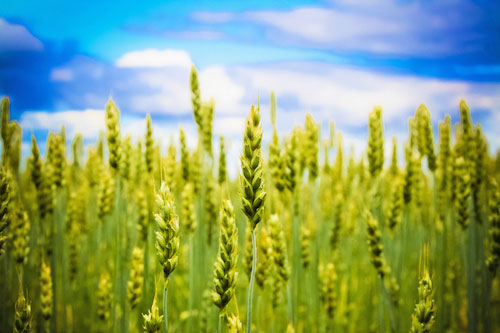
The Problem is Not Wheat Itself
The demonization of wheat has gotten out
of hand. The problem is not wheat itself...
Instead of blaming nutritious, organic,
whole wheat for all of our problems, it is more helpful to look at
what kind of wheat we are eating, how it is being grown, how it is
being processed, how it is being prepared and other factors:
-
Organic
Wheat vs. Conventional Wheat:
Is your wheat grown organically
or conventionally?
If it's not organic, chances are very
high it's being
doused with glyphosate, the highly toxic and
probably carcinogenic
pesticide made by
Monsanto and used in their
RoundUp.
Do you really want
to be ingesting that stuff, when it suffocates cells'
(plants or animals) pathways and starves them of vital
nutrients?
-
US Wheat
vs. Wheat from other Nations:
Apparently, other nations
outside the US have not hybridized and altered the wheat to
maximize its gluten content in such a dramatic manner.
There
is anecdotal evidence that people eating Australian wheat or
Italian wheat don't suffer the same kind of problems that
have when consuming American wheat.
-
Whole
Wheat vs. White Wheat:
Whole wheat, like any other
grain, is far superior in terms of health than the white,
refined version.
Exactly the same goes for brown and white
rice. Why eat a grain whose nutrients have been so stripped
to the point where only carbohydrates remain? The only
advantage of refined grains is a longer shelf life. Do you
want to sacrifice health
for convenience?
Go the extra mile and ensure you
get whole wheat, and eat it soon so it doesn't go bad.
-
Fresh
Wheat vs. Rancid Wheat:
It goes without saying that
fresh food is healthier than rancid or stale food.
Whole
grains contain oils in their kernels, which can go rancid if
you do not consume them soon after harvesting, or if they
are stored inappropriately. Are you eating fresh wheat?
-
Fermented Wheat vs. Non-Fermented Wheat:
The fermentation of food is an
important part of its preparation.
In general we do not eat
enough fermented foods, which means we are not taking good
enough care of supporting and maintaining the right balance
of
probiotics in our gut - which are the basis of our
immunity.
Fermenting foods changes their chemistry, often in
positive ways. In the case of wheat, fermenting it can
transform and remove its phytic acid content, which is not a
healthful part of the grain.
There are many sourdough wheat
bread options around, and healthy fast-food chain Chipotle
recently added whole wheat sourdough tortillas to their
menu!
-
Gluten
Sensitivity Self-Diagnosis:
Many people are falsely
diagnosing themselves with gluten intolerance or gluten
sensitivity. It would be better to go to a health
professional or doctor (whether allopathic or naturopathic)
to test this rather than assuming it.
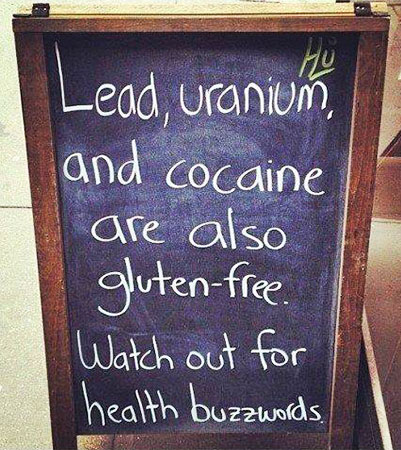
Gluten-free has
become a buzzword
Conclusion - Think and Test for
Yourself when it Comes to Gluten-Free
Maybe you are one of those (rare) people
that does suffer from
celiac disease or other gluten-caused diseases
(I know someone who suffered greatly from what appears to be
gluten-triggered
Hashimoto's disease).
In that case, gluten is obviously not
for you.
However, chances are for most people
that consuming some gluten is not a problem.
If you are avoiding it, you may just be
going along with the latest health
fad, rather than doing anything truly meaningful to improve
your health, such as,
-
eating organic
-
eating more raw foods
-
eating more fermented foods
-
eating more fruits and veggies
-
eating more whole foods in
general
Focus on Being Nutritionally
Literate More Than Gluten-Free
Health fads come and go.
Today soy is good, tomorrow soy is bad.
Today potatoes are bad, tomorrow potatoes are good. Don't go along
with the crowd just because it's cool, trendy or you believe you are
improving your health without investigating it and knowing it fully.
Educate yourself and become more nutritionally
literate. Meanwhile, stay open to wheat.
Grab some organic, sourdough, whole
wheat bread and enjoy...!
Sources
|






